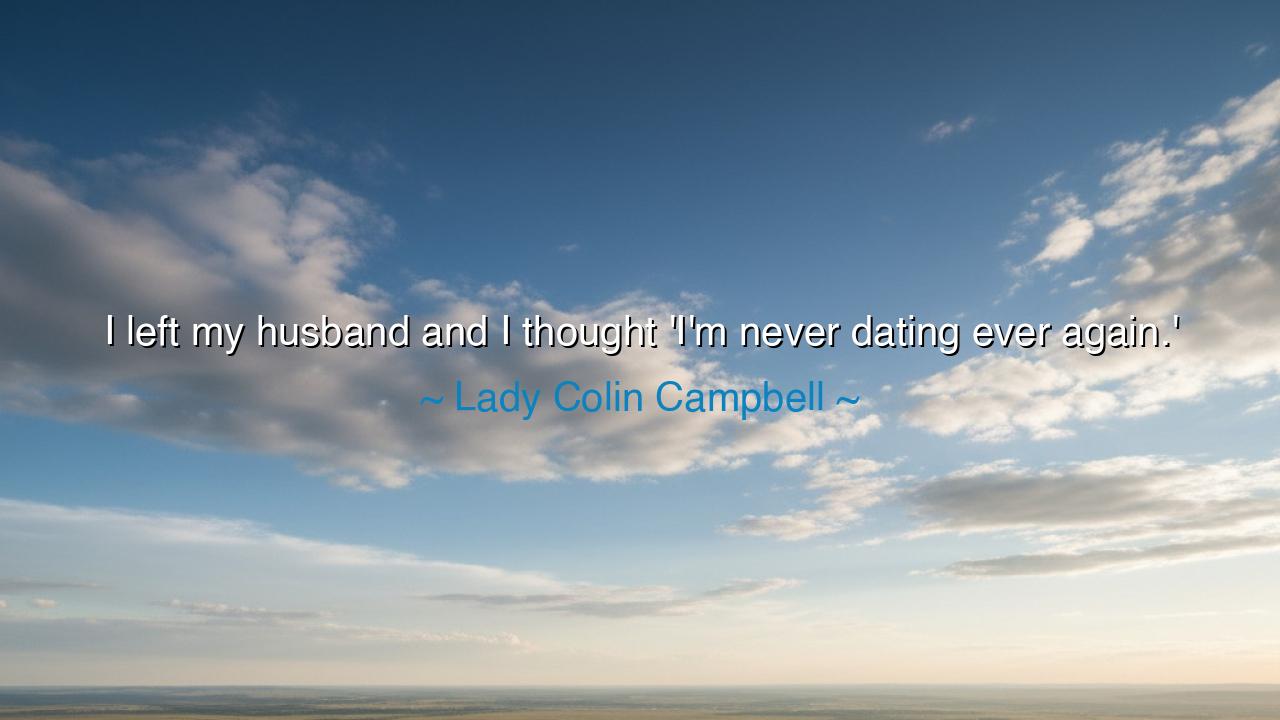
I left my husband and I thought 'I'm never dating ever again.'






When Lady Colin Campbell said, “I left my husband and I thought ‘I’m never dating ever again,’” she was not merely recounting a moment of heartbreak—she was declaring a vow born of awakening. Beneath her words lies the cry of a soul that has walked through the fire of disillusionment and emerged with both scars and strength. Her statement speaks to the timeless human experience of retreat after betrayal, the desire to reclaim one’s sovereignty when love has turned to pain. In her voice, we hear the same tone that has echoed through the ages—the tone of those who have loved deeply, lost profoundly, and chosen self-preservation as their act of power.
For when a woman leaves what was once her home, she does not merely close a door; she closes a world. To leave a husband, to abandon what was once believed to be eternal, is an act both tragic and heroic. It is to stand upon the ashes of shared dreams and say, “No more.” And when she adds, “I thought I’m never dating ever again,” she gives voice to the instinct of the wounded heart—to protect itself, to build walls against further invasion. But behind that vow lies not weakness, but wisdom. The ancients would have called it the season of solitude, the necessary winter that must follow a storm before the soul can bloom again.
Consider the tale of Queen Elizabeth I of England, who, after witnessing the treacheries of courtly marriage and the brutal fates of women bound to ambition or deceit, swore herself to remain unwed. “I will have but one mistress here, and no master,” she said, choosing her throne and her autonomy over the bonds of romance. In this, she, like Lady Colin Campbell, found a new kind of sovereignty—the reign of the self. To renounce love after pain is not to turn away from life, but to reclaim dominion over one’s spirit. It is the act of saying: I am whole, even alone.
Yet, though such vows are born of sincerity, time has a way of softening the iron of the heart. The ancients taught that love is a river—it carves its way through stone, patient and eternal. To say “never again” is to defy that river, and though for a time one may dam its flow, eventually the waters return, reshaping the heart’s landscape anew. Lady Colin’s declaration, then, stands as both truth and transformation: a truth in its moment, when pain was raw and clarity absolute; and transformation in its lesson, that from endings often rise the beginnings of a wiser, gentler kind of love.
Her words also remind us that solitude is sacred. In an age that fears being alone, her choice stands as a defiance against dependency. To withdraw from romance is not always despair—it can be an act of spiritual cleansing. The hermits of the desert, the philosophers of Athens, the poets of Tang China—all knew that after deep hurt, one must retreat to rediscover the self unshackled. It is in that silence, away from noise and longing, that one’s true essence is revealed. The heart, once quieted, learns again to trust not in another’s love, but in its own endurance.
From her experience we may draw this lesson: healing demands distance, and strength requires solitude. There are times in life when the greatest act of courage is to say, “Enough.” To stop chasing affection and instead sit with oneself. Let no one mistake withdrawal for weakness; it is the pause before renewal, the breath before the next great act. For love, like the seasons, returns not to those who seek it frantically, but to those who have learned to stand firm in the winter of their own soul.
So, my listener, remember Lady Colin Campbell’s words not as bitterness, but as testimony. When love has wounded you, when trust has crumbled, it is not shameful to turn inward. Guard your heart as a fortress until it remembers its strength. In time, the gates may open again—not out of need, but out of abundance. For the one who learns to be alone has mastered the highest art of all: to love oneself without condition. And from that strength, should love return, it will find you not broken, but whole.






AAdministratorAdministrator
Welcome, honored guests. Please leave a comment, we will respond soon